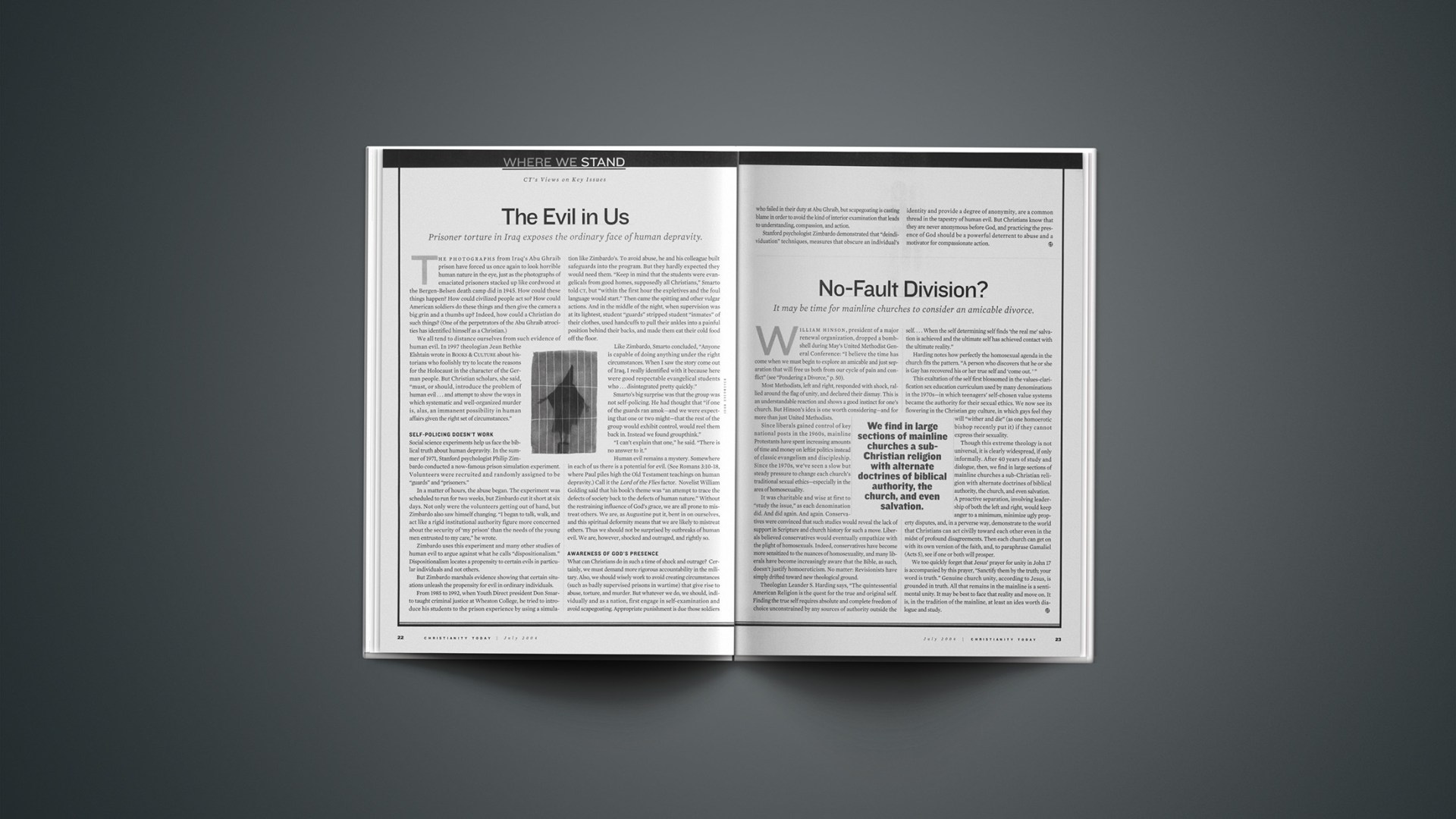The photographs from Iraq’s Abu Ghraib prison have forced us once again to look horrible human nature in the eye, just as the photographs of emaciated prisoners stacked up like cordwood at the Bergen-Belsen death camp did in 1945. How could these things happen? How could civilized people act so? How could American soldiers do these things and then give the camera a big grin and a thumbs up? Indeed, how could a Christian do such things? (One of the perpetrators of the Abu Ghraib atrocities has identified himself as a Christian.)
We all tend to distance ourselves from such evidence of human evil. In 1997 theologian Jean Bethke Elshtain wrote in Books & Culture about historians who foolishly try to locate the reasons for the Holocaust in the character of the German people. But Christian scholars, she said, “must, or should, introduce the problem of human evil … and attempt to show the ways in which systematic and well-organized murder is, alas, an immanent possibility in human affairs given the right set of circumstances.”
Self-policing doesn’t work
Social science experiments help us face the biblical truth about human depravity. In the summer of 1971, Stanford psychologist Philip Zimbardo conducted a now-famous prison simulation experiment. Volunteers were recruited and randomly assigned to be “guards” and “prisoners.”
In a matter of hours, the abuse began. The experiment was scheduled to run for two weeks, but Zimbardo cut it short at six days. Not only were the volunteers getting out of hand, but Zimbardo also saw himself changing. “I began to talk, walk, and act like a rigid institutional authority figure more concerned about the security of ‘my prison’ than the needs of the young men entrusted to my care,” he wrote.
Zimbardo uses this experiment and many other studies of human evil to argue against what he calls “dispositionalism.” Dispositionalism locates a propensity to certain evils in particular individuals and not others.
But Zimbardo marshals evidence showing that certain situations unleash the propensity for evil in ordinary individuals.
From 1985 to 1992, when Youth Direct president Don Smarto taught criminal justice at Wheaton College, he tried to introduce his students to the prison experience by using a simulation like Zimbardo’s. To avoid abuse, he and his colleague built safeguards into the program. But they hardly expected they would need them. “Keep in mind that the students were evangelicals from good homes, supposedly all Christians,” Smarto told CT, but “within the first hour the expletives and the foul language would start.” Then came the spitting and other vulgar actions. And in the middle of the night, when supervision was at its lightest, student “guards” stripped student “inmates” of their clothes, used handcuffs to pull their ankles into a painful position behind their backs, and made them eat their cold food off the floor.
Like Zimbardo, Smarto concluded, “Anyone is capable of doing anything under the right circumstances. When I saw the story come out of Iraq, I really identified with it because here were good respectable evangelical students who … disintegrated pretty quickly.”
Smarto’s big surprise was that the group was not self-policing. He had thought that “if one of the guards ran amok—and we were expecting that one or two might—that the rest of the group would exhibit control, would reel them back in. Instead we found groupthink.”
“I can’t explain that one,” he said. “There is no answer to it.”
Human evil remains a mystery. Somewhere in each of us there is a potential for evil. (See Romans 3:10-18, where Paul piles high the Old Testament teachings on human depravity.) Call it the Lord of the Flies factor. Novelist William Golding said that his book’s theme was “an attempt to trace the defects of society back to the defects of human nature.” Without the restraining influence of God’s grace, we are all prone to mistreat others. We are, as Augustine put it, bent in on ourselves, and this spiritual deformity means that we are likely to mistreat others. Thus we should not be surprised by outbreaks of human evil. We are, however, shocked and outraged, and rightly so.
Awareness of God’s presence
What can Christians do in such a time of shock and outrage? Certainly, we must demand more rigorous accountability in the military. Also, we should wisely work to avoid creating circumstances (such as badly supervised prisons in wartime) that give rise to abuse, torture, and murder. But whatever we do, we should, individually and as a nation, first engage in self-examination and avoid scapegoating. Appropriate punishment is due those soldiers who failed in their duty at Abu Ghraib, but scapegoating is casting blame in order to avoid the kind of interior examination that leads to understanding, compassion, and action.
Stanford psychologist Zimbardo demonstrated that “deindividuation” techniques, measures that obscure an individual’s identity and provide a degree of anonymity, are a common thread in the tapestry of human evil. But Christians know that they are never anonymous before God, and practicing the presence of God should be a powerful deterrent to abuse and a motivator for compassionate action.
Copyright © 2004 Christianity Today. Click for reprint information.
Related Elsewhere:
More on the Christian response to Abu Ghraib, and prison abuse is available on our hot topic page.










